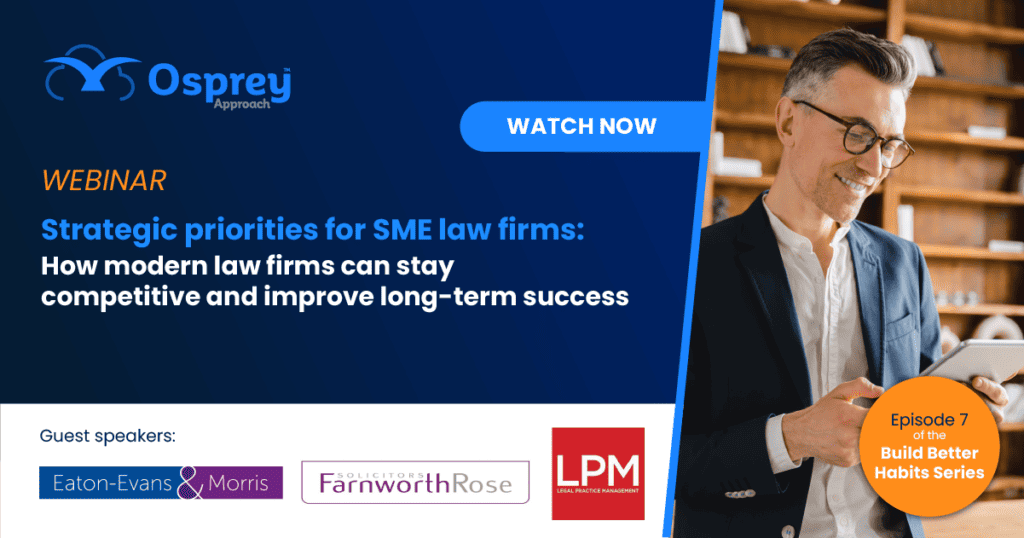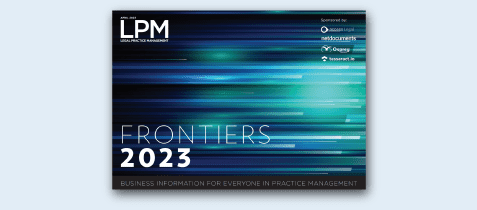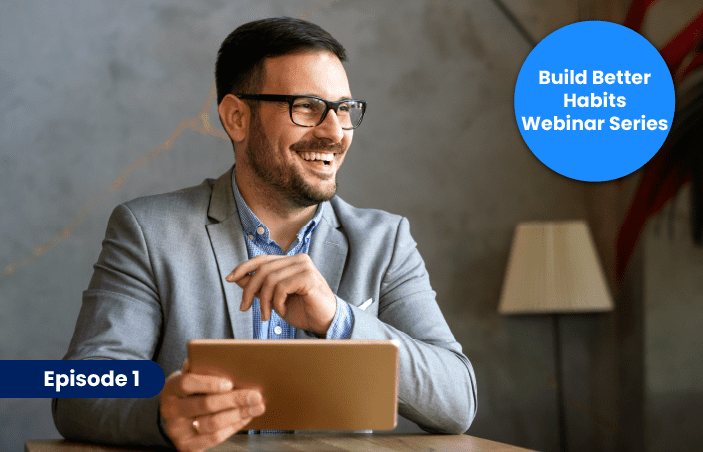Contents
Strategic priorities for SME law firms: How to stay competitive and improve long-term success
For episode seven of the Build Better Habits webinar series, we were joined by Sarah Charlton, CEO of Eaton-Evans & Morris Solicitors, Sophie Holdsworth, operations director for Farnworth Rose Solicitors, and Rupert Collins-White, co-CEO of LPM. Our expert panel deep dived into the stats of the 2023 LPM Frontiers report to discuss the strategic priorities of SME law firms to help them stay competitive, increase profitability, and improve the ROI of software investments.

How can modern law firms enhance their client experience?
The top priority for the majority of law firms – according to the Frontiers report – was improving the client experience. With this in mind, we asked the panel to share their advice on how this can be achieved.
Sarah began by stating that, culturally, there are often obstacles around capturing, evaluating, and actioning client feedback and often it’s because, “smaller firms have a real emotional attachment to the service they provide. And so, even if you can get a good sample size of feedback, solicitors can become defensive over the work they’ve done.”
That’s why Sarah recommended that, “whoever is reviewing the client experience, ideally [it] needs to be someone who isn’t delivering the service so they can look at it impartially and make positive suggestions.
“Solicitors traditionally like to deliver law how they want, which isn’t necessarily how the client would like to receive it.”
Sophie explained that this year they’ve done an internal review of their own client experience. “We’ve set up internal focus groups, which have everybody involved from all levels in the firm, to review the objectives we’ve set for ourselves. We started by identifying our client’s pain points and understanding what value we can provide at each touchpoint.”
Sophie described how this shift in focus is also benefitting their employees and workplace culture. “When employees are happier in what they’re doing it’ll impact our clients in a positive way.” By building a client-focused culture it also ensures people are held accountable for their behaviour, “it’s important we pull each other up on things that don’t align with our objectives and ask ‘what can we do to ensure our actions align?’ ”.
From speaking to the LPM audience, Rupert highlighted the importance of benchmarking your service levels against what your clients really expect. “Firms typically benchmark their service against other law services, but their clients often never experience another legal service so that’s not how they benchmark quality customer service.
“You need to benchmark your service against what else your client is experiencing. You could ask your clients to name a really good customer experience they’ve had and use that to shape the experience you deliver.”
Rupert also reminded firms that their workforce are a representation of your audience, so don’t forget to ask them the same question as they can provide great insight.
What impact does becoming data-driven and digital-first have on long-term success?
Our panellists agreed that the strategy of the firm needs to be driven by the needs of the client.
Sarah explained: “Our business model is one where we want to be able to invest time and money into the client experience, so we use technology behind the scenes to create efficiencies – that the client wouldn’t necessarily see. Technology helps us to offer a face-to-face service and ensure our prices don’t need to increase because we’re so efficient behind the scenes.”
Sophie agreed, explaining, “we’ve adopted various tech over the years – some client facing, others for internal use – to help us always be available for our clients.”
Having access to real-time accurate data enable firms to make more effective strategic decisions. Sophie shared how, “capturing the right data is important for our long-term success because it helps us to be more scientific with our strategy and budget planning. Osprey helps us with that because we’ve set up various daily and weekly reports that are shared with all staff to help us keep on track and see our proactively see our progress against KPIs and targets.”
Rupert advised that firms should focus on whether they’re consistently collecting and monitoring data for long enough periods of time. “For me, being data-driven is about understanding the data you have and to do this you need to have collected enough historical data to provide the right insights and to enable continuous improvement.
“If you’re not feeding the tech with the right data, it’s just nonsense. A starting point for firms is to focus on what data you have and how you’re storing it.”
Eight habits law firms should adopt to improve profitability
94% of firms in the Frontiers report predicted their revenue will increase over the next 12 months but 82% said overhead costs would also increase. It’s important for long-term success that firms consider the impact this could have on profitability, so we asked our firm leaders what habits should firms adopt to boost profitability.
The panel agreed that modern law firms should focus on the following habits to improve profitability.
- Improve efficiencies
Streamlining internal operations helps to increase the value charged for every hour worked. Sophie advised that firms should, “create robust, repeatable processes that are easy for staff to follow. Utilise Osprey – or your case management system – to create workflows and standardise processes.”
2. Adopt a digital-first mindset
Sophie recommended, “adopting more digital solutions and capture the right data.” Digital tools help firms to improve efficiency internally, that will positively impact the client, which in turn increases recommendations to new clients. Collecting the right data with the tech then provides firms with the stats needed to make improvements.
3. Improve internal collaboration
Rupert suggested firms improve the internal integration of processes. “Focus on the integrational changes you can make to improve productivity. Ask yourself ‘how can we internally be a more joined up business?’ and that’ll accelerate profitability.”
4. Be all over the numbers
Making decisions based on data rather than gut feelings ensures you’re not making assumptions but are led by fact. Sarah advised, “don’t let the numbers stop you from taking risks, but you need data to back you up, so you can make data-driven predictions.”
5. Know your worth
To ensure you’re maximising the value from your hours worked, Sophie suggests firms should, “know their worth. Charge clients based on your knowledge, length of experience, and the service you provide. It’s important fee earners know the value they provide clients.”
6. Build the right culture
The effectiveness of your team is what will impact your client service, profitability, and long-term success. Sarah explained how it’s important to have the right culture in your firm: “You have to have the right culture that aligns with your business goals. For example, we’ve built a continuous improvement culture so the team are used to change and can easily adapt. But to have an effective culture you need the right people.”
7. Hire effectively
Not only do you need to hire the right people to fit your culture, but firms should consider whether hiring more people is going to improve productivity or harm profitability. Rupert explained that, “salaries have increased so much recently that firms should consider whether hiring more people is effective. Analyse whether you can be more productive with the resource you have first.”
8. Prioritise an operational role
If reviewing operational processes isn’t someone’s priority with in the firm, then it won’t happen. Rupert advised, “You need to hire someone whose job it is to process map and review if the operations are effective. Someone who is responsible for asking, ‘is this efficient?’. This doesn’t have to be a full time person, it can be a consultant.”
How can firms maximise ROI on software and legal tech investments?
The average IT spend for SME law firms is currently 6.5%, but 53% of leaders said they predict an increase over the next 12 months. Rupert highlighted that firms typically use less than 50% of the software features they pay for, so firms can achieve a better ROI with the tech they already have if it’s utilised better.
With that in mind, Rupert recommended choosing a software solution that “is going to provide benefit year on year, rather than just fixing an immediate problem.” Sarah agreed that firms shouldn’t, “just buy a new toy because someone else has. Ensure your tech investments align with your business goals and strategy.”
To avoid features going unused Sarah stressed the importance of engaging the team: “Don’t just buy the software and forget about it. It’s important to engage the team and continually evaluate if the product and ROI is being maximised.” Rupert suggested that firms, “go to your provider and ask, ‘what are the quick wins?’ It’s the responsibility of both parties to improve utilisation, but firms have to actively ask for advice on better utilising the system.”
Sophie echoed the panel’s views: “My top three tips for utilising tech is to: take all the training that’s offered to you, work with your provider to continually develop the product to suit your firm, and always provide feedback to your provider to help the solution work better in practice.”
How does a firm’s pricing model impact client service?
The insights from the Frontiers report showed a 50 / 50 split of firms who operate by billable hour or fixed fee. The current debate is whether the billable hour is still relevant for modern law firms and whether it positively impacts employees and clients.
Sarah focused on two things when looking at pricing models: the client and regulations. “I have strong opinions on the new value-based pricing discussions and from a regulatory perspective, it’s not often going to be in the client’s best interest to agree a fee based on value. It’ll be interesting to see how lawyers can justify cost when costs lawyers grill them.
“However, in relation to pricing in general it comes back to our previous point of, how a solicitor may want to deliver work isn’t necessarily what the client wants or expects. Billable hours can mean it can take longer for fee earners to complete work, which from an efficiency perspective is challenging.”
Sophie said she believes one size doesn’t fit all, “this is a developing area for us and we currently offer a hybrid of both. Ultimately what we decide will differ between work types and the client.”
Rupert added that, “the best approach to how firms bill should be based on the work they want to do. Is your pricing model going to win you the work in the areas you want to strategically grow in?”
Prioritise tech, data, and the client experience to stay competitive long-term
The insights from LPM’s Frontiers report highlighted the top three strategic priorities SME law firms planned to focus on in the next 12 months, which can provide a clear roadmap on how to stay competitive. You only have to be one percent better then your competition to stand out from the crowd.
Adopting a digital-first mindset can help to build the foundation for becoming a data-driven firm, and successfully analysing the insights you collect can help you understand how best to enhance your client experience. The three priorities work hand in hand to run a modern law firm effectively.
This episode highlighted how all three strategies can help to improve profitability, but it’s important firms have a clear business goal in mind, hire the right people that align with that goal, and utilise digital tools to help create efficient internal operations.
We’ve outlined four fundamental habits that a modern law firm should adopt for long-term success, which are covered habits in our Build Better Habits webinar series and are available to watch on-demand now.






